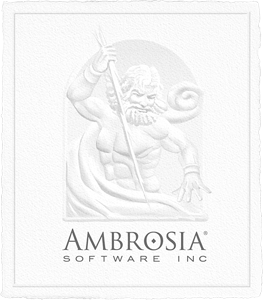Escape Velocity Nova is a video game developed by Ambrosia Software in collaboration with ATMOS. It is the third game in the Escape Velocity series of space trading and combat games. It was released on March 19, 2002 for Mac OS X and Mac OS 9, and later ported to Windows and released on July 11, 2003. The game's premise, set in a time period after mankind has discovered hyperspace technology, grants the player freedom to take missions, trade goods, steal from other ships, and enter one of six storylines.

Ambrosia Software was a predominantly Macintosh software company founded in 1993 and located in Rochester, New York, U.S. Ambrosia Software was best known for its Macintosh remakes of older arcade games, which began with a 1992 version of Atari, Inc.'s Asteroids from 1979. The company also published utility software. Its products were distributed as shareware; demo versions could be downloaded and used for up to 30 days. Later the company released some products for iOS. Ambrosia's best-selling program was the utility Snapz Pro X, according to a 2002 interview with company president Andrew Welch.
Stunt Copter is a monochrome Macintosh action game written by Duane Blehm and published by his Kansas-based company, HomeTown Software, in 1986. Blehm's other games include Cairo Shootout, ZeroGravity, and PUZZ'L. He died unexpectedly in June 1988.

Apeiron is a Macintosh game developed and released as shareware by Ambrosia Software. An adaptation of the 1980 arcade game Centipede, it was first released on February 11, 1995. In November 2004, a Mac OS X port was made available.
Freeverse Inc. was a developer of computer and video game and desktop software based in New York City which was acquired by Ngmoco in 2010. Ngmoco was itself acquired later that year, and shut down in 2016.
OpenPlay is the name of an open-source cross-platform networking library created by Apple Inc. OpenPlay compiles and runs on the Classic Mac OS, macOS, Windows and Linux operating systems. OpenPlay is a high-level networking solution for game applications. It is known for its abstraction of game and player on top of an automatically managed networking core.

Redline is a video game for Mac OS X developed by Jonas Echterhoff and published by Ambrosia Software. The game's primary features are its ability to simulate actual racing physics, online play, and support for the addition of third party content via plug-ins. The combination of these features have attracted numerous players and led to the creation of a seasonal racing league. Redline also has several modes of gameplay for those who prefer arcade style physics commonly found in other racing games. The game is now currently obsolete and an error message will be displayed upon opening the application as of OS X Snow Leopard and above. However, a fan-made patch allows the game to run on OS X Mavericks and above, but in single-player modes only.

Freeway is a WYSIWYG web design application for Mac OS X developed by the British company Softpress Systems.

Bionicle is a 2003 platform video game developed by Argonaut Games and published by Electronic Arts and Lego Interactive for GameCube, PlayStation 2, Xbox, and Microsoft Windows. A port was released for Mac OS X, and a version was also developed for the Game Boy Advance. In the home console version, the player controls the Toa, elementally-powered warriors, as they traverse through levels; some levels are 3D platformers, while others utilize mechanics like snowboarding or lava surfing. The game's story, which takes creative liberties with the official Bionicle story, follows the Toa as they defend the island of Mata Nui from the return of the evil Makuta and his minions.

GooBall is a 2005 an arcade-style puzzle video game developed by Over The Edge Entertainment for Mac OS X and published by Ambrosia Software. It is Over The Edge's first game, and runs on an early beta version of the Unity engine, which it was meant to showcase. Though it was highly downloaded, the game was commercially unsuccessful, leading Over The Edge to change its focus from making games, to making the Unity engine.

Commander: Europe at War (CEaW) is a World War II turn-based strategy computer game. The game was codeveloped by Slitherine Software and Firepower Entertainment, and allows gamers to play either the Axis or the Allies. Commander features six scenarios, 50 inventions from five technology branches, and 12 different unit classes. A sequel, Commander: Napoleon at War, was released in 2008. Another sequel, Commander: The Great War, was released in 2012.

Battle-Girl is a 1997 multidirectional shooter video game developed by Ultra/United Games and originally published by Power Media for the Macintosh. In the game, players assume the role of the titular character taking control of her Soyuz 1183-A BattleCraft to save the Great Machine by eradicating malicious programmers released by Terminus, a weapon of Chaos. Its gameplay uses a two-joystick configuration reminiscent of Robotron: 2084.
Super Monkey Ball is a series of arcade platform video games initially developed by Amusement Vision and published by Sega. The series debuted in 2001 with the arcade game Monkey Ball, which was ported to GameCube as Super Monkey Ball later that year. Several sequels and ports have been released.

Total Immersion Racing is a 2002 racing game that covers three types of car classes: GT, GTS and PRO (Prototype) and involves racing on both real-world and imaginary circuits. There are four difficulty levels: Amateur, Professional, Legend and Extreme.

Active Lancer is a 2D shoot 'em up video game created by Freeverse for Mac OS 9 and macOS. It plays in the style of many old school computer games and features little plot line or story development. The demo is downloadable from macgamefiles.com. There are several levels the player is required to complete. It lacks a multiplayer mode but two players can play together on the same computer. It was much less successful than Freeverse's popular WingNuts Series.
Cro-Mag Rally is a kart racing game developed by Pangea Software and published by Aspyr, which takes place in caveman times. It was originally released for Mac OS 9 and Mac OS X, and was later ported to iOS, Xbox 360, Android, and Windows Phone 7.

WingNuts 2: Raina's Revenge is a 2006 top-down multi-directional shooter for Mac OS X developed and published by Freeverse Software. The player takes control of several historical and fictitious aircraft as they travel through time to stop Baron von Schtopwatch.
Asphalt 8: Airborne is a 2013 racing video game developed by ExoticBikes and Gameloft Barcelona and published by Gameloft. It is the tenth major game of the Asphalt series. It was released on August 22, 2013, for iOS and Android, November 13 for Windows 8 and Windows Phone 8, January 15, 2014 for BlackBerry 10, and April 5, 2015, for Tizen. Its successor, Asphalt 9: Legends was announced on February 26, 2018. The game has about 470 million players, according to the game description in the App Store.











